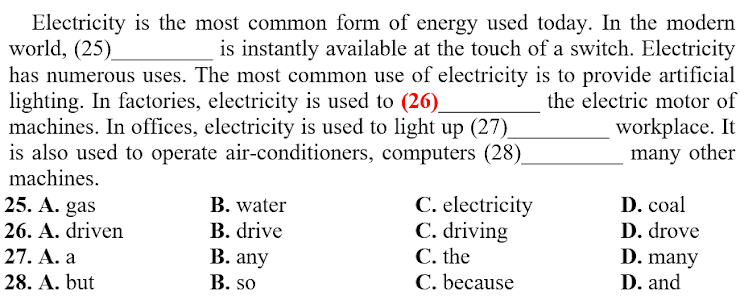Read the following passage and mark the letter A, B, C, or D on your answer sheet to indicate the correct word or phrase that best fits each of the numbered blanks from 31 to 35.
If you are an environmentalist, plastic is a word you tend to say with a sneer or a snarl. It has become a symbol of our wasteful, throw-away society. But there seems little doubt it is here to stay, and the truth is, of course, that plastic has brought enormous (31) __________ even environmental ones. It's not really the plastic themselves that are the environmental evil - it's the way society chooses to use and abuse them.
Almost all the 50 or so different kinds of modern plastic are made from oil, gas or coal-non-renewable natural (32) __________ We import well over three millions tones of the stuff in Britain each year and, sooner or later, most of it is thrown away. A high (33) __________of our annual consumption is in the form of packaging, and this constitutes about 7% by weight of our domestic refuse. Almost all of it could be recycled, but very little of it is, though the plastic recycling (34) __________ is growing fast.
The plastics themselves are extremely energy-rich - they have a higher calorific value than coal and one (35) __________ of "recovery" strongly favoured by the plastic manufacturers is the conversion of waste plastic into a fuel.
Điền ô số 31
A. savings
B. pleasures
C. benefits
D. profits


Đáp án C
Giải thích: Benefits (n) = những lợi ích
Dịch nghĩa: It has become a symbol of our wasteful, throw-away society. But there seems little doubt it is here to stay, and the truth is, of course, that plastic has brought enormous benefits even environmental ones. = Nó đã trở thành một biểu tượng của xã hội ném đi lãng phí của chúng ta. Nhưng có vẻ như rất ít nghi ngờ rằng nó vẫn tồn tại, và sự thật là, tất nhiên, nhựa đã mang lại lợi ích to lớn thậm chí cả những lợi ích về môi trường.
A. savings (n) = sự tiết kiệm, khoản tiền tiết kiệm
B. pleasures (n) = sự thoải mái, sự hài lòng
D. profits (n) = lợi nhuận